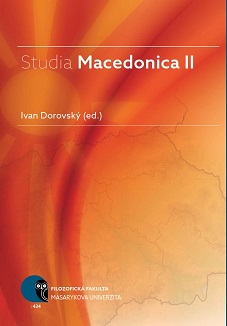Přínos literárního historika Zdeňka Urbana pražské makedonistice
Literary historian Zdeněk Urban’s contribution to the Praque’s Macedonian studies
Author(s): Marcel Černý
Subject(s): Macedonian Literature, South Slavic Languages, International relations/trade, Higher Education , History of Education, Philology
Published by: Masarykova univerzita nakladatelství
Keywords: Zdeněk Urban; Slavic studies; Prague; history of education; university education; South Slavic literature; Macedonian literature;
Summary/Abstract: Author of this article deals with Zdeněk Urban’s (1925–1998) Macedonian studies, especially his innovative doctoral dissertation on the Faculty of Arts of the Charles University in Prague Beginnings of the Macedonian literature in relation to the other South Slavic literatures and their reflections in Czech one (in Czech; 1949). Urban’s other works were mainly aimed at Bulgarian, folklore or Sorbian studies. There are some supplements of this article: a list of contents of Urban’s doctoral dissertation, review of its supervisor (Antonín Frinta) and opponet (Julius Dolanský) and the list of his Macedonian contributions. Urban explained the genesis of the Macedonian literature in two phases. Initially the feudal ecclesiastically Slavonic culture became the bourgeois (works of Kărčovski and Pejčinovič) and only then the young Macedonian middle class took part in the cultural life during its struggle against the hellenization from the 1850s. As the first Macedonian written literature was closely bound up with the Bulgarian one, the Macedonian National Revival gained extrinsically pure Bulgarian traits. Urban interpreted this fact from the Marxist point of view: qualitatively more backward and quantitatively weaker Macedonian bourgeoisie learnt from richer and culturally more advanced Bulgarian one during the common struggle for the national school system, church and culture. This direct contact between both literatures was radically disturbed in the 1870s, when the revolutionary democrats got control of the Bulgarian literary field. Urban anticipated in his monograph From the History of Czech-Bulgarian Cultural Contacts (in Czech; 1957) and article Problems of the Comparative Studies of South Slavic Literatures in the 19th and the 20th centuries (in Czech; 1968) Ďurišin’s conception of theory of the interliterariness process with its most important ideas of dioecism (polyoecism) and biliterarity (polyliterarity) in his interpretation of the “borderline” Bulgarian-Macedonian literature phenomenons.
Book: Studia Macedonica II
- Page Range: 46-72
- Page Count: 27
- Publication Year: 2015
- Language: Czech
- Content File-PDF

